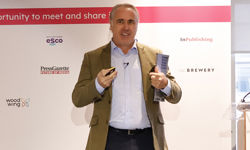Over the years, I have developed a certain affection for a few types of copywriting. Long sales letters, especially if set in Courier. That quirky stuff you get on the backs of Innocent smoothies, Ribena cartons and Ben and Jerry’s ice cream tubs. And even Google Adwords, which approach the simplicity and resonance of haiku. Yet, there are other classes of – can I call it copywriting? not really but it’ll do for now – that leave me puzzled at best and groaning at worst.
Skip intro
Let’s start with the bookies’ favourite (well, mine, anyway) for the "most pointless two words in the English language" handicap. The handicap in question being the writer’s total lack of insight into why people visit websites.
Just the other day, I was researching content for a client’s case study and out of the five websites they gave me to look at, no fewer than three had, you guessed it, a "movie" with the deathless phrase "skip intro" somewhere towards the foot of the page. I’m sure you’ve seen them: two minutes of silky/juddery/morphy nonsense, no doubt intended to lull you to sleep so that the dubious claims that follow won’t be subjected to critical scrutiny.
Now, let’s ask the owner of this website a question. Did you think I typed in your URL so I could watch a movie? Duh! I want information and I want it now. Only a fool actively erects barriers between a potential customer and his content.
I think I know what’s going on. The companies who pay for this type of website usually don’t rely on it for sales. It’s largely an exercise in self-aggrandisement, so the practice of Flashturbation is entirely in keeping with the garbled corporate nonsense that takes up the rest of the site. But then, hey, they probably send out sales letters that start "As a valued client" as well.
I have a suggestion for a more user-friendly line of copy on the home page. It reads: "Play pointless Flash movie that we paid a fortune for and are now desperate to have you watch." Then the small children at whom these animations are so clearly aimed could sit there all day watching zebras turning into photocopiers while the rest of us get on with some work.
Mission or miasma?
Driving from Salisbury to lunch with a friend last month, I overtook (at no more than the legal limit I hasten to add) a police car. Emblazoned along its dayglo-chequered flank was the following statement:
"Reducing fear…stopping crime…preventing disorder."
And it made me think: why did they bother? Now don’t get me wrong, I fully support the police in these laudable activities. But what, precisely, was the point of this statement? Were we to think that, unless it was there, the Wiltshire constabulary might have been engaged in the reverse? "Increasing fear…encouraging crime…fomenting disorder." In fact, using the Sunfish Sense Reverser (SSR) – (patent applied for) – on mission statements, and various other sales claims and slogans, will often show them up for the crashing exercises in futility they really are.
Let me give you a few more examples:
| Mission statement | SSR version |
| We aim to be the best offset litho printer in the North West. | We aim to be the worst offset litho printer in the North West. |
| We want to be the caterer of choice for office functions on the Bilbury Enterprise Park. | We don’t want any company on the Bilbury Enterprise Park to choose us as their office caterer. |
| To be a creative, responsive, cost-effective advertising agency. | To be a hackneyed, complacent, over-priced advertising agency. |
See what I mean? If the reverse of the mission statement is ridiculous, then why bother stating that you want to be the opposite?
Whenever I am asked about mission statements, my eyes glaze over and a picture forms in my mind. I see ten extremely important people in a room, the opportunity cost of which alone would make the shareholders blench, tossing around descriptive phrases ranging from the bland to the bombastic. They worry about the legality of certain claims, the possible misinterpretation of others, the precision or brand-coherence of the whole. Many hours and meetings later, they stop. The mission statement is finished.
Nine times out of ten, the result is a consensus-driven phrase combining shaky grammar, mind-numbing blandness and tenuous relevance to the commercial goals of the organisation. And where are the customers in all this? Are they now getting better value for money? More innovative products? Better customer service? I doubt it. And that’s why I recently turned down the opportunity to help a company rewrite its mission statement. Calling back to suggest alternative uses of their time and copywriting budget, I had to wait for around two minutes before their clearly disenchanted receptionist picked up my call. Hmmm.
Very few businesses have got into trouble because they didn’t have a mission statement. Plenty have through ignoring customers, running poor quality marketing campaigns, recruiting ineffective sales people or failing to communicate the benefits of doing business with them.
Do you dissolve your worries in a solution?
I was taking my three-year-old son to his nursery recently and we saw a lovely big truck, on the side of which was emblazoned a picture of a window frame and the immortal line "joinery solutions".
He looked up at me and said, "Daddy, why doesn’t the man just say ‘Handmade hardwood window frames?’" (He’s very advanced for his age – that last piece of copy I wrote for you? – he did the first draft.) And I had to think for a bit.
"Perhaps," I said, "he’s worried that if he says that, people won’t take him seriously."
"Yes, Daddy," he said. "But now they don’t know what makes him special."
"Well then," I continued, a little nonplussed at this cross examination, "maybe he thinks ‘joinery solutions’ is a modern thing to say."
"But that’s what everyone says now, Daddy. Thank goodness at nursery we have toast in the morning, not ‘thermal bread solutions’."
He was right, of course. (I must give him a pay rise.) In just one week I saw the following:
* "Delivering solutions globally"
* "Drinking water solutions"
* "Image solutions"
* "Customer relationship management solutions"
And best of all, by some considerable margin, in an advert for the lingerie section of a local department store: "Bra solutions".
This is what’s known in the copywriting business as me-too-itis. I must refer it to my good friend Dr Maslenski at the Syntactical Institute of Vienna for clinical investigation.
The funny thing is, nobody who actually BUYS any of this stuff actually gives an expletive solution for ‘solution’. Householders who want new wooden window frames generally call them just that. And, having checked with a couple of my female acquaintances, I can confidently assert that women go shopping for a new bra — not a new bra solution.
So what’s going on? I suspect it has something to do with bored marketing executives wishing their products were more "exciting" and trying to jazz them up by hitching them to the s-word. Either that or imagining their customers will somehow feel cheated at being offered just a spade instead of an "excavation solution". This is sheer laziness. If you don’t think "spade" is sufficient to sell spades, then do your research and be creative. Truly creative. Call it an "old-style, drop-forged spade with ash haft and non-blister grip". More people will buy it and you’ll make more money.
In fact, going back to the vehicle that sparked this particular mini-rant, truck-sides are just about the worst medium to write for. Like posters (or billboards), the handles of petrol pumps and button ads on the web, you’ve hardly any space (relative to the size of type) but just as much to say as you do in a 4,000-word DM piece. The results are usually a kind of slack-jawed, "I give up" underarm toss of a line, often involving "solutions". Occasionally, though, you see a gem. My favourites are:
* "Eat more chips" – for a local potato grower (think about it)
* "Jam, potatoes, custard" – for a cattle feed supplier (mmmm, almost good enough to eat)
and
* "Cress makes a meal…nutritious and delicious" – for a watercress company (true-ish, and you have to admire their chutzpah)
"Solutions" is just one of a whole class of words that get pressed into service as a substitute for creativity and hard work. Of course you want your products to get customers salivating (particularly if you’re selling a mixture of jam, potatoes and custard).
But that means thinking about what they’re really looking for. And yes, of course they want a solution to a problem of some kind, but what they DON’T want — or ever think of asking for — is a blah blah solution.
Is there an alternative?
In place of these egregious examples of the non-copywriter’s art, let me propose simple alternatives. Unless you are running a children’s website, forswear introductory animation in favour of a direct appeal to your visitor’s self interest. (If you’ve been gulled by your web designer into paying to augment their animation portfolio, signpost it along with other equally interesting pages on your site like "legal notice" or "site map".)
If somebody at your company proposes either creating or revising your mission statement, gently ask them how many customers actually care. Then suggest fixing something really important, like customer service. Or your train wreck of a P&L. And if you see the word "solutions" anywhere, pick up a text deletion solution and just scrub it out.










